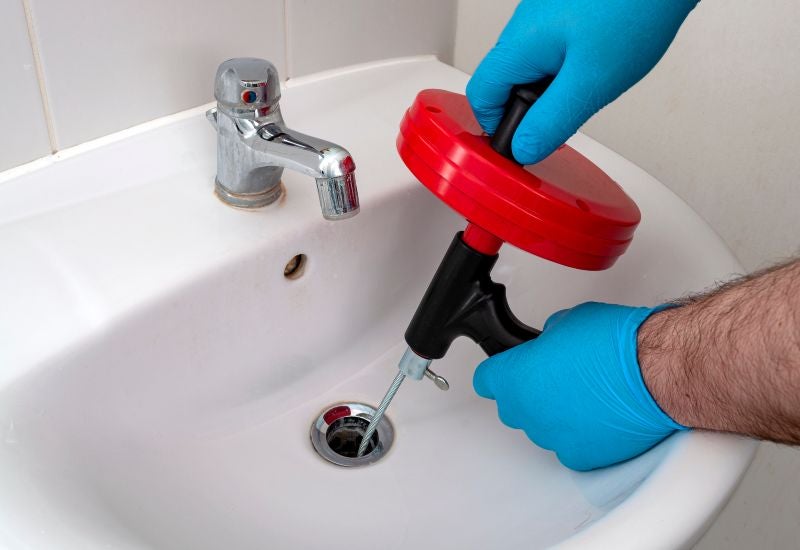Applying Plunger and Drain Cleaner: Successful Strategies
Applying Plunger and Drain Cleaner: Successful Strategies
Blog Article
The publisher is making a number of great annotation on Tips on How to Effectively Use a Plunger in general in the article below.

Introduction
Correct maintenance of household drains is vital for avoiding clogs and making sure smooth water flow. One of the key tools in every home owner's toolkit is the bettor, alongside numerous drainpipe cleaners created to deal with stubborn clogs properly. This post discovers exactly how to make use of plungers and drainpipe cleansers efficiently to keep your drains streaming openly.
Section 1: Comprehending Plungers
Sorts of Plungers
There are a number of sorts of bettors readily available, each developed for different types of drains pipes and clogs. The most common kinds include mug plungers, flange bettors, and accordion bettors.
How Plungers Work
Plungers work with the principle of developing stress and suction to dislodge blockages. When effectively applied over a drain, they produce a vacuum cleaner that can take out debris or separate blockages.
Choosing the Right Plunger
Picking the right bettor depends upon the type of drain and the nature of the blockage. Mug bettors are perfect for sinks and tubs, while flange bettors are better fit for commodes because of their design.
Usual Errors with Bettors
Preventing these mistakes makes sure efficient plunging: inappropriate seal around the drain, not enough force, and unclear surrounding particles.
Section 2: Using Plungers Efficiently
Prep work
Prior to plunging, make certain the plunger covers the drainpipe completely and creates a limited seal. Clear any visible debris around the drain opening.
Strategy
Begin with gentle plunging movements to build suction. Increase stress progressively, making use of a steady rhythm. Repeat as needed till the drain gets rid of.
Repairing Tips
If plunging doesn't work, attempt readjusting the seal, applying petroleum jelly for a far better seal, or using a different sort of bettor.
Area 3: Recognizing Drainpipe Cleansers
Sorts Of Drain Cleansers
Drain cleaners can be chemical or enzymatic. Chemical cleaners utilize solid chemicals to dissolve obstructions, while enzymatic cleansers make use of natural enzymes to break down raw material.
Exactly How Drain Cleaning Company Work
Chemical cleaners react with obstructions to dissolve them, while chemical cleaners break down natural materials like hair and oil without hurting pipes.
Safety and security Considerations
Constantly put on gloves and eye defense when using chemical drainpipe cleaners. Ensure adequate air flow and adhere to maker instructions thoroughly.
Eco-Friendly Alternatives
Take into consideration utilizing vinegar and baking soft drink or enzyme-based cleaners for environmentally friendly alternatives that are safer for pipelines and the atmosphere.
Area 4: Using Drain Cleaning Company Effectively
Application Techniques
Put chemical cleansers directly into the drainpipe opening. Allow them to help the recommended time prior to flushing with hot water. Enzymatic cleansers need to rest overnight.
Precautions
Avoid mixing different kinds of cleaners, as this can create hazardous fumes. Never utilize chemical cleansers combined with a bettor, as splashing can occur.
Taking Care Of Stubborn Clogs
For relentless obstructions, think about utilizing a pipes snake or calling a professional plumbing professional to stop damages to pipelines.
Final thought
To conclude, comprehending how to use bettors and drainpipe cleaners efficiently is important for maintaining healthy and balanced plumbing systems. By choosing the right devices and strategies, property owners can tackle small clogs and protect against major pipes problems down the line.
How To Properly Use A Plumbing Snake To Clear Drains
When any drain clogs in our home arise, we tend to gravitate toward the plunger and little else. In cases where the plunger and its vacuum-created pressure are not able to clear clogs, many immediately move to harmful chemicals or simply call their plumber to fix the issue.
we’re happy to help with all drain cleaning needs and concerns. This includes informing you on a few other home remedies you may have at your disposal for minor to moderate clogs, one of which is the use of a plumbing snake. Many people have never used one of these before – let’s go over the steps to take when your drain clogs and you have a plumbing snake available.
Attempt Plunger Use
The first step here, as we noted above, should indeed be to grab your plunger when you notice a drain clog and attempt to resolve it this way. If you’re unsure how to use a particular type of plunger, our plumbers can answer any questions you have. If this doesn’t do the trick, however, you move on to the snake.
Locate And Prepare Snake
A plumbing snake is a metal or plastic device that’s generally about a quarter of an inch thick. It’s design with significant extensions, meant to reach down into your clogged drain and push the clog out. Snakes also contain drain augers that will latch onto and push stubborn blockages.
If your plunger doesn’t clear a clog, locate your snake and bring it to the drain in question. We also recommend keeping a bucket nearby to collect the clog once you pull it out, plus we’d advise wearing goggles and possibly protective gloves.
Feed Snake
Once you’re ready to go, feed the snake slowly down the drain, using the crank device it comes with to keep it moving until it finds the clog. Once this happens, much of the clog will be latched onto the coil so you can pull it out, while the rest will simply break up and flow downward.
Detach Debris
Remove the snake slowly from the drain, and once you’ve done so, pick off any debris that’s stuck to the coil. This is another area where wearing gloves is a must.
Flush Drain
Finally, take a few minutes to ensure the snake has done its job correctly. If you’ve been using it on a toilet, flush the toilet a couple times and make sure everything flows well. If you’ve used it on a different drain, flush it with some room temperature water.
https://www.mybuddytheplumber.com/blog/how-to-properly-use-a-plumbing-snake-to-clear-drains/

Application Techniques
Put chemical cleansers directly into the drainpipe opening. Allow them to help the recommended time prior to flushing with hot water. Enzymatic cleansers need to rest overnight.
Precautions
Avoid mixing different kinds of cleaners, as this can create hazardous fumes. Never utilize chemical cleansers combined with a bettor, as splashing can occur.
Taking Care Of Stubborn Clogs
For relentless obstructions, think about utilizing a pipes snake or calling a professional plumbing professional to stop damages to pipelines.
Final thought
To conclude, comprehending how to use bettors and drainpipe cleaners efficiently is important for maintaining healthy and balanced plumbing systems. By choosing the right devices and strategies, property owners can tackle small clogs and protect against major pipes problems down the line.
How To Properly Use A Plumbing Snake To Clear Drains
When any drain clogs in our home arise, we tend to gravitate toward the plunger and little else. In cases where the plunger and its vacuum-created pressure are not able to clear clogs, many immediately move to harmful chemicals or simply call their plumber to fix the issue.
we’re happy to help with all drain cleaning needs and concerns. This includes informing you on a few other home remedies you may have at your disposal for minor to moderate clogs, one of which is the use of a plumbing snake. Many people have never used one of these before – let’s go over the steps to take when your drain clogs and you have a plumbing snake available.
Attempt Plunger Use
The first step here, as we noted above, should indeed be to grab your plunger when you notice a drain clog and attempt to resolve it this way. If you’re unsure how to use a particular type of plunger, our plumbers can answer any questions you have. If this doesn’t do the trick, however, you move on to the snake.
Locate And Prepare Snake
A plumbing snake is a metal or plastic device that’s generally about a quarter of an inch thick. It’s design with significant extensions, meant to reach down into your clogged drain and push the clog out. Snakes also contain drain augers that will latch onto and push stubborn blockages.
If your plunger doesn’t clear a clog, locate your snake and bring it to the drain in question. We also recommend keeping a bucket nearby to collect the clog once you pull it out, plus we’d advise wearing goggles and possibly protective gloves.
Feed Snake
Once you’re ready to go, feed the snake slowly down the drain, using the crank device it comes with to keep it moving until it finds the clog. Once this happens, much of the clog will be latched onto the coil so you can pull it out, while the rest will simply break up and flow downward.
Detach Debris
Remove the snake slowly from the drain, and once you’ve done so, pick off any debris that’s stuck to the coil. This is another area where wearing gloves is a must.
Flush Drain
Finally, take a few minutes to ensure the snake has done its job correctly. If you’ve been using it on a toilet, flush the toilet a couple times and make sure everything flows well. If you’ve used it on a different drain, flush it with some room temperature water.
https://www.mybuddytheplumber.com/blog/how-to-properly-use-a-plumbing-snake-to-clear-drains/

As a fervent person who reads on How to Use a Plunger to Unclog a Toilet or Drain, I imagined sharing that piece of content was sensible. If you liked our blog posting kindly remember to share it. Bless you for your time. Return soon.
Call Today Report this page